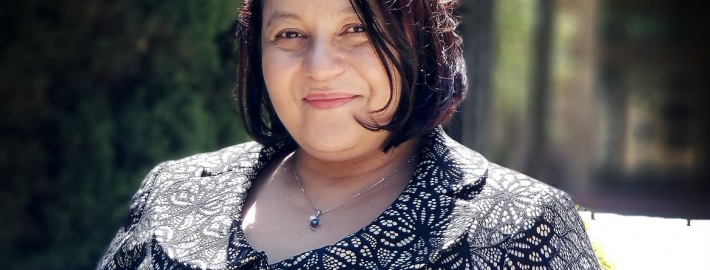Q&A: Norma Mendoza-Denton on how Donald Trump weaponizes words
Norma Mendoza-Denton, professor of anthropology in the UCLA College, studies the language used by President Donald Trump and politicians of all stripes. She’s co-editor (with Janet McIntosh of Brandeis University) of a new book, “Language in the Trump Era: Scandals and Emergencies,” which brings together 27 academics — including three other UCLA professors, H. Samy Alim, holder of the David O. Sears Presidential Endowed Chair in the Social Sciences and professor of Anthropology and African American Studies; Otto Santa Ana, professor emeritus of Chicana and Chicano studies, and Aomar Boum, associate professor of anthropology and Near Eastern languages and cultures — to analyze and understand the language of our current political moment. In this interview, Mendoza-Denton talks about how Trump uses words to manipulate reality, and how linguists can help us view politics through a more critical lens.

Norma Mendoza-Dutton, professor of anthropology in the UCLA College. (Photo courtesy of Norma Mendoza-Dutton)
What did you set out to do with “Language in the Trump Era”?
For me, the main purpose of this book has been to try to equip people to do their own analyses on the fly. So that when you hear something coming from a political figure or from somebody in authority, you have some tools to say, “Oh my gosh, I recognize this, it’s a discourse pattern that somebody is putting out there. And as a discourse pattern, I’m able to name it and I’m able to have it not take me in.” It’s a kind of tool set for people to make their own determination about what they believe.
As a linguistic anthropologist, how do you study Trump? Do you watch his rallies and read his tweets, just like the rest of us?
Yeah. He’s a very productive data source, you can just imagine. There’s a really excellent resource that you can get if you go to Factba.se. It’s a compendium of everything he’s ever said, tweeted and videoed out. And it’s searchable.
The introduction describes Trump as a “linguistic emergency.” What does that mean?
One of the ways that we mean “linguistic emergency” is that Trump is using language to shape reality. He’s able to say, “This agency can no longer talk about climate change.” When you’re able to legislate something in this way, it means that unless people are aware of the way that language is being regimented around them, their reality is changing right under their feet.
Another example is when he accuses someone of a crime, even though they’ve been exonerated. With Kamala Harris and the “Birther 2.0” thing, he says, “I don’t know, but somebody very highly qualified says that she’s not able to run.” When he keeps repeating it and the airways repeat it for him — because he’s news, he’s the president — it goes a long way toward creating the reality that all of us share. Even if it’s not true, it plants a little bit of a doubt in the average person’s mind: is she really not qualified? Or wait, I know that she is, but should she be? It creates a discourse, and that’s why it’s a linguistic emergency. We haven’t had somebody that holds so much power who so continuously changes the linguistic ground under our feet. That’s really a pressing thing for us to understand.
The book breaks down a lot of phrases that we’re all familiar with at this point. One chapter, written by co-editor Janet McIntosh, professor of anthropology at Brandeis University, discusses the terms “crybabies” and “snowflakes.” Why are politicians using these words?
McIntosh’s term “semiotic callusing” is really applicable here. It’s a way of saying to everybody else, “the people that have complaints about this are just weak.” It’s a continuation of a discourse that we have in the U.S., first identified by George Lakoff, which is that the Republicans are like the strict father and the Democrats are the indulgent, overprotective mother. By setting up the crybabies and snowflakes discourse, the Republicans have managed to continue the discourse of the strict father. And Trump is like the ultimate strict father in this way. He’s calling out the weaklings, showing his own power, but also demonstrating to people how they should be treating others. It’s setting the stage for us to not only understand ourselves as being subject to this kind of power, but to regard each other in this way. To regard somebody who needs help to make ends meet as a weakling or somebody who yells on the street as acceptable, because they’re not being a snowflake, or to see people who are trying to get redress for past wrongs as crybabies.
It’s also mimicked by the left, where they start calling out people on the right, saying, “Who’s the snowflake now?” It’s amplified on both sides.
Yeah, that’s a great point. Again, because the language is creating reality, you get swept up in the logic and you start reproducing that same idea, instead of challenging the premise of it to begin with.
The phrase “fake news” seems to be another major new feature of our discourse. Is this just a part of our politics now, referring to something as fake news?
I don’t think the strategy is new. This is a strategy that was used by Mao Zedong, it was used by Stalin, it was used by Hitler. Victor Klemperer has a book about the ways in which the Nazis crafted language and a big part of it was basically going against the press and questioning independent news. It’s not a new thing at all, but definitely “fake news” —that’s part of the genius of Trump. He’s able to come up with these incredibly audiogenic, pithy little sayings like “fake news” that just stick. Now people are using “fake news” in non-Trump contexts all the time. At first it starts as a joking thing, they’re kind of making fun of Trump. But now it’s just used in a kind of normal way. So, you can see he’s a source of linguistic innovation, and that’s really interesting.
Trump famously said that he was going to “build the wall and make Mexico pay for it.” Obviously, Mexico was not going to pay for it, and everybody knew this. What is he doing when he says things like that?
He’s basically creating a show. He’s creating a form of entertainment that we are supposed to participate in. By saying, “I have the biggest crowd. I have the most beautiful wall. It’s getting made,” — first of all, it doesn’t matter that half of the assertions that he makes are actually suspect, right? But they paint a particular picture. And frankly, when you’re one of his supporters, you’re in a mode of suspending disbelief as it is. So, once you’re in that suspension of disbelief, it paints the whole tableau so that you can get carried away in the illusion.
What can linguists do to help ordinary people understand and cope with Trump’s language on a daily basis?
All of us are linguists in a way. All of us try to be critical when somebody makes an argument and they’re trying to pull a fast one on you, each one of us has to use our critical capacity, to try to figure out how reality is being constructed for us. And I think that that’s for me the most important thing. It doesn’t matter what spectrum of politics you’re coming from. As long as you’re equipping yourself to be able to understand when somebody is pulling a fast one or working against your interests, even though they claim to be working for your interests, when they reverse themselves, when they contradict themselves, when they’re calling someone names just to be memorable, instead of accurate.
This article originally appeared in the UCLA Newsroom.




